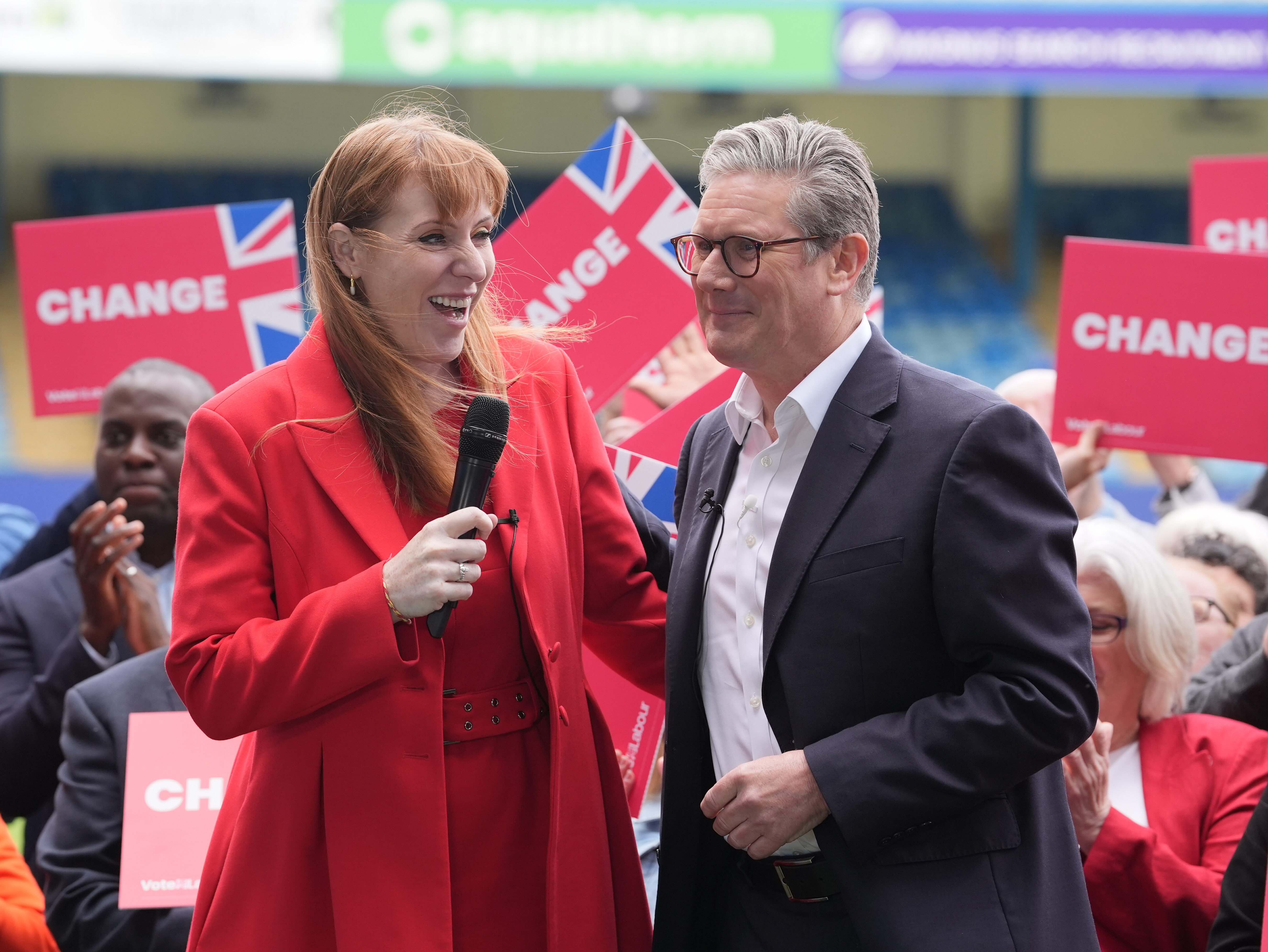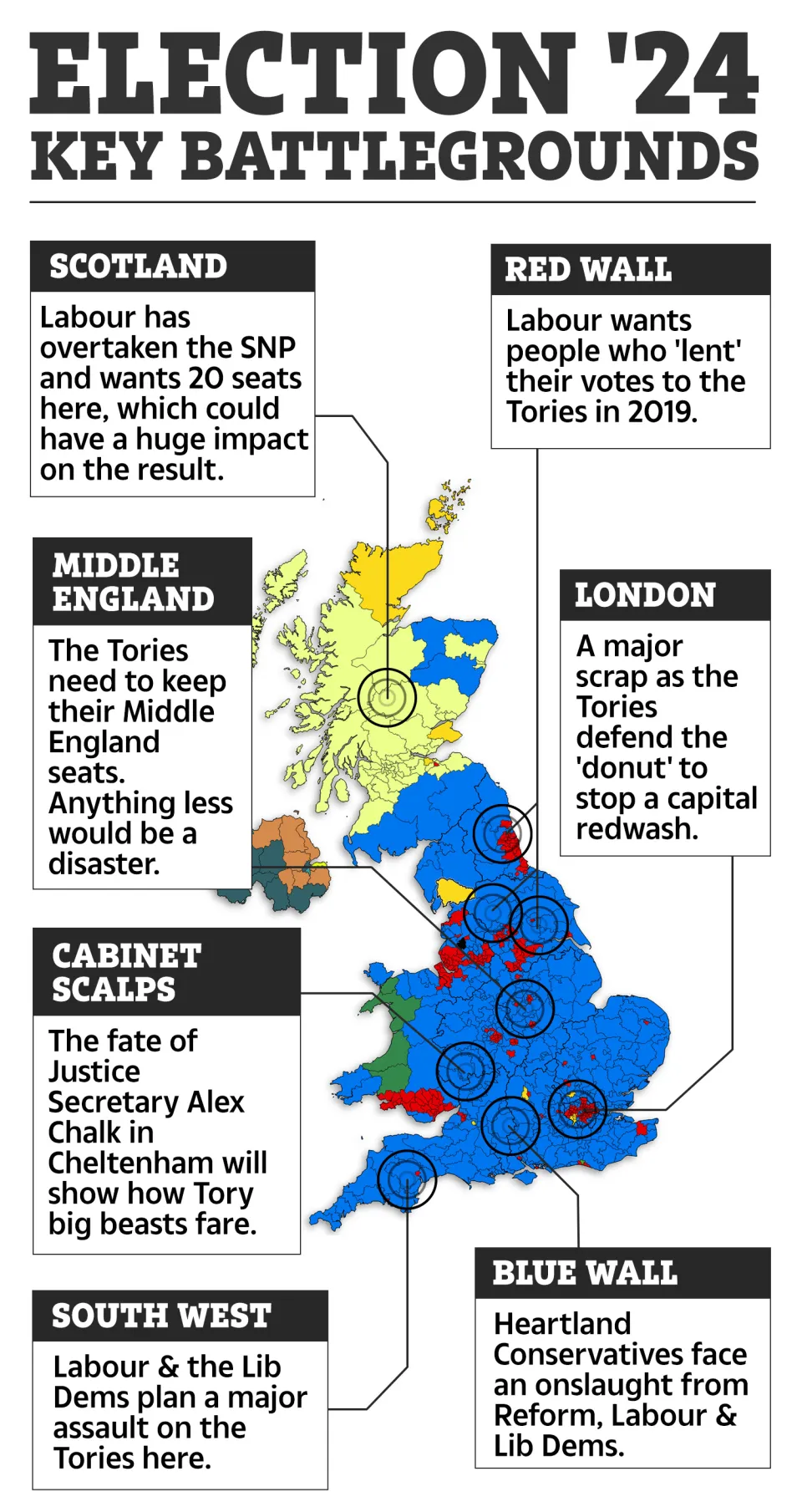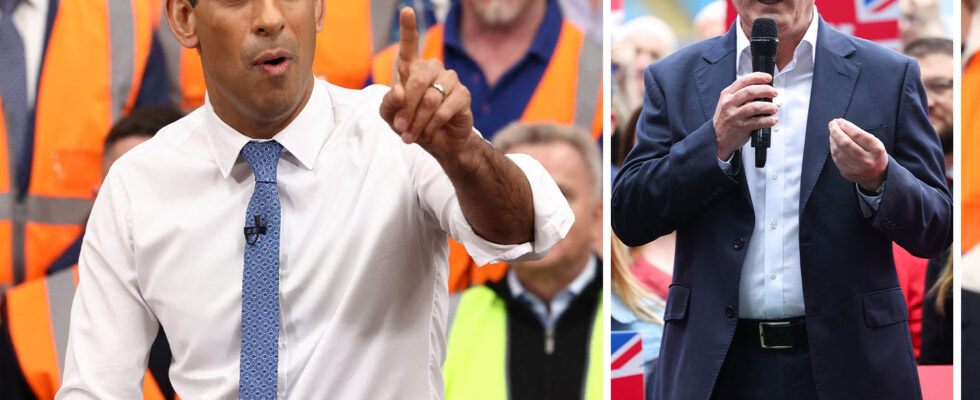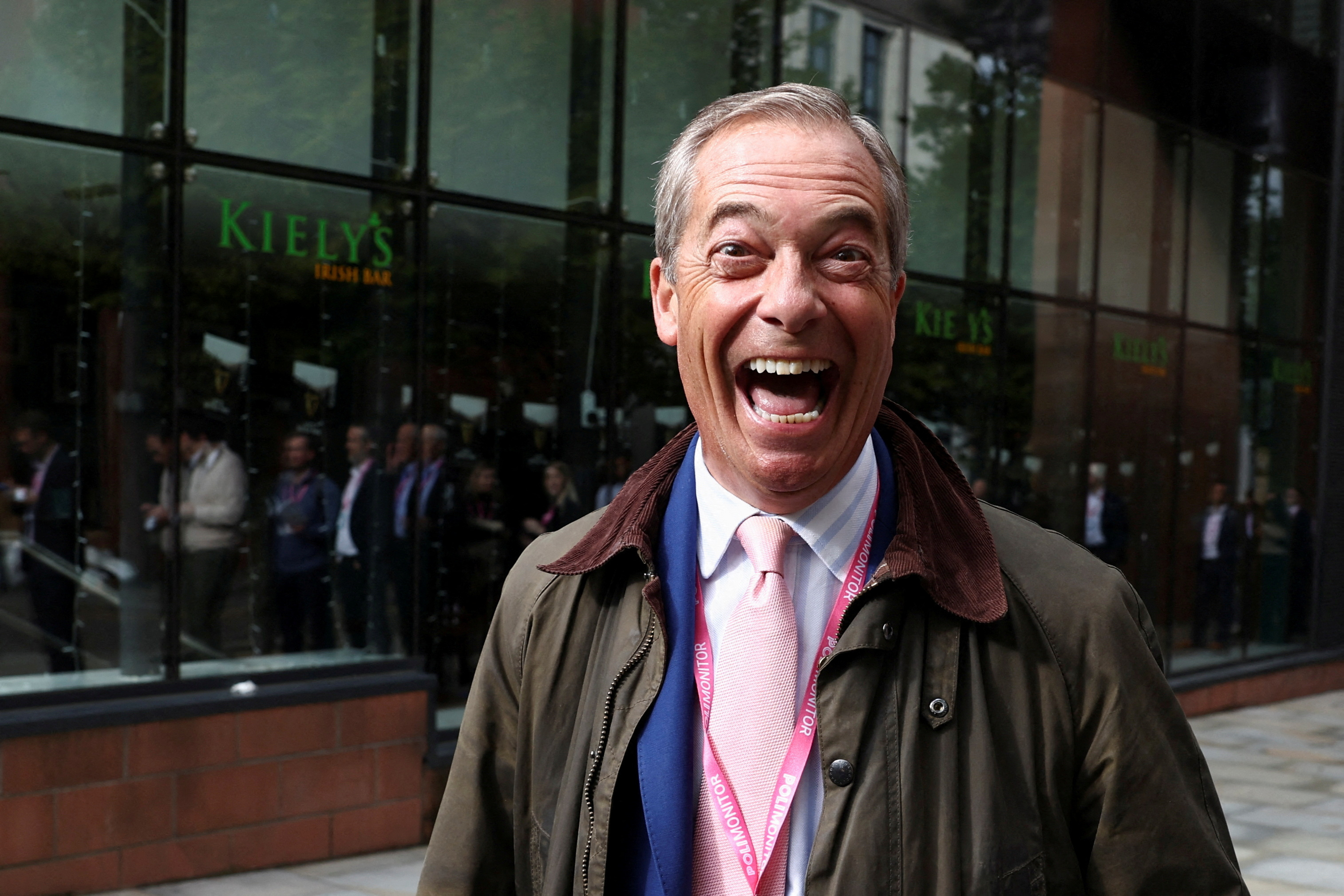RISHI Sunak today burst onto the election campaign trail with a blast that Sir Keir Starmer will clobber families with tax hikes.
Kicking off a lightning tour of all four nations, the PM said that “more spending equals more taxes” with Labour.


Labour have denied plotting tax and pensions raids although have come under constant scrutiny about their spending plans.
Mr Sunak lashed out at a campaign event in Derbyshire on the first full day on the road.
He said: “Crucially, talk about pound in your pocket, your taxes are being cut. Because of what we’ve been able to do, an average person earning £35,000 is getting a £900 tax cut.
“That’s what you get with the Conservatives, your taxes being cut so your hard work is rewarded, your family has financial security.
“That is a contrast at this election because, as I said, the Labour Party are going to spend more money, and that is just going to put your taxes up.
“There’s no other way to pay for it, they can pretend all they want. More spending equals more taxes, and I don’t want to see that happen.”
At a rival event Sir Keir hit back that the Tories simply offered five more years of “chaos”.
In key election developments:
The race for No10 kicked into life this morning as both the PM and Sir Keir Starmer hit the campaign trail on day one.
Six weeks of vote-battling commences as the PM embarked on a media blitz from Derbyshire before a whistle-stop tour of all four UK nations.
All party leaders are out in public following yesterday’s dramatic announcement of a July 4 poll.
During a series of interviews this morning Sunak put the economy and immigration at the heart of his pitch to voters.
The 7 key issues that will decide the General Election
By JACK ELSOM, Chief Political Correspondent
Economy
BOTH Tories and Labour will want to stake a claim as the party of economic stability and prosperity.
Previous elections show that voters tend to reward the incumbent government if they feel better off – and punish them if they do not.
Sunak – an unashamed numbers bod – is most comfortable when defending his economic record and has a flurry of recent victories to sell.
Inflation has been sharply reduced to within touching distance of the 2 per cent target, Britain has exited recession, and the IMF has projected strong growth.
Labour will aim to trash that record and point to Liz Truss’ chaotic mini-Budget.
Stability or change?
DO voters want to stick with what they know, or is there an appetite for change?
That question cuts to the heart of the election, with both leaders sensing mileage in the other.
After being dealt a bad hand, Sunak has insisted he has turned things around and put the country on course for a “brighter future”.
He says Starmer would “take us back to square one.”
For his part, Starmer insists that “stability is change” and a switching of the guard is desperately needed.
Immigration
SUMMER is the high season for Channel crossings and the sight of small boat arrivals will likely raise the salience of illegal migration as an electoral issue.
Mr Sunak believes voters back his Rwanda plan and will draw a clear dividing line with Labour for vowing to axe it altogether.
Questions now hang over whether the PM can fast-track the first plane to take off before Polling Day as the civil service grinds to a halt.
The numbers are currently not in Sunak’s favour, with illegal migration running at a higher rate than any year on record.
And legal migration is still stubbornly high and miles off Boris Johnson’s 2019 pledge of 250,000.
Crime
IN recent months both Sunak and Starmer have made big pitches as being tough on law and order.
Realising voters are fed up with crime going unanswered and unsolved, expect them to talk in the strongest terms about cracking down on theft, shoplifting and antisocial behaviour.
Crime has traditionally been comfortable Tory territory and Sunak will likely make pledges about giving police more powers to blitz yobs.
But Starmer has spied an opportunity to park Labour tanks on his lawn and has been hamming up his previous career as a top prosecutor.
NHS
CUTTING NHS waiting lists is the single pledge Sunak has openly admitted he is failing to hit.
He has blamed the lack of progress on endless strikes, but now rarely talks about it as an issue compared to the economy and immigration.
Labour on the other hand see it as home turf and will be hammering the government’s handling of the health service.
Polls consistently put the NHS as one of the public’s top priorities and Starmer will look to weaponise the groaning backlog.
But he will be forced to defend the Welsh Labour administration’s record which is arguably worse than the Tories’.
War
THE world is becoming more dangerous and the public is looking at Sunak and Starmer to keep them safe.
Sunak will point to his recent pledge to ramp up defence spending to 2.5 per cent of GDP by 2030 – and seize on Starmer’s refusal to match that.
Labour has outlined an “ambition” to hit that target but is yet to spell out a pathway to fund it, accusing ministers of cooking the books.
And expect Tory MPs to dredge up Starmer’s years-long support for Jeremy Corbyn.
A knock-on effect of global unrest is the domestic reaction to the war in Gaza, which has the possibility to seriously hurt Labour.
Many of the party’s once-solid Muslim support base are furious with Starmer’s support for Israel.
Net Zero
SUNAK has promised voters will not pay in the pocket for the drive towards Net Zero, delaying green targets to ease the financial burden on families.
Whereas Labour are promising an eco revolution backed by billions of pounds of spending and Ed Miliband leading the charge.
Expect the Tories to warn of tax rises to pay for this as well as further climate clampdowns like Sadiq Khan’s hated Ulez expansion in London.
With Reform wanting to ditch Net Zero altogether, Sunak will likely try to blunt their attacks by vowing Brits will never suffer as a result.
Pointing to inflation falling, he said: “I think after a difficult few years, I’m pleased that economic stability is now returning to the country.”
And he hailed the “bold” Rwanda plan and said border controls was “a great thing to be talking about at this election”.
But he admitted that a flight to Kigali will not take off until after the election if he is re-elected.
He said: “If I’m elected I’ll get the flights off… after the election.”
It raises the prospect of not a single flight going to Rwanda as Sir Keir has vowed to scrap the plan if elected.
Yesterday rain-drenched Mr Sunak blindsided the country – including most of his own Cabinet – by gambling on an early election rather than waiting until the autumn.
Asked why he braved the downpour, Mr Sunak this morning said he felt it proper to call the election outside the famous black door of No10 as has become tradition.
Fellow Tory MP Jacob Rees-Mogg praised the weather-defiance saying: “I thought it was absolutely magnificent. I thought it was just the best British stoicism, the stiff upper lip.”
Economy dominates
During a blizzard of media interviews from Derbyshire, the PM hammed up his economic credibility.
He said: “I think after a difficult few years, I’m pleased that economic stability is now returning to the country.
“We’ve just seen that inflation has returned to normal, the economy is growing at a healthy rate again, wages have been rising sustainably for several months now, and although I know not everyone is feeling the full benefits of that yet, it’s clear that we have turned a corner.
“So now is the moment to look to the future, and the world is clearly in a more uncertain place than it’s been in decades.
“And the question for the country is, the choice of this election is, who’s got the boldest ideas, the clearest plan to provide a secure future for you and your family?”
How the previous elections have unfolded
By JACK ELSOM, Chief Political Correspondent
2019 – the Brexit election
Boris Johnson called the 2019 general election to break the Commons deadlock over Brexit.
A coalition of Opposition parties and Tory Remainers were blocking his deal from passing and effectively putting the country in limbo.
After purging the Conservatives rebels – and battling Jeremy Corbyn to actually let him trigger the election – the date was set for December 12.
The winter campaign saw Johnson adopt an effective Get Brexit Done slogan while Labour struggled to explain their policy of holding a second referendum.
The result saw the collapse of Labour’s Red Wall fortress of northern seats who switched to back the Tories and helped them win an 80-seat landslide majority.
2017 – May fluffs it
Theresa May was riding high in the polls in the spring of 2017 when she decided on a walking weekend in Wales to call a snap election.
While commanding a slim majority, she wanted her own mandate having inherited No10 from David Cameron after a Tory coronation contest.
But the wheels quickly fell off her presidential-style campaign, resulting in a disastrous press conference where she infamously insisted “nothing has changed!” as her social care policy was ripped to shreds.
It cost her the Tory majority as Jeremy Corbyn performed better than expected, and May was forced to do a confidence and supply deal with the DUP.
2015 – Cameron wins majority
David Cameron let his Tory-Lib Dem coalition reach its full five years, resulting in a long 2015 campaign.
He successfully turned on his own deputy PM Nick Clegg – blaming them for all the faults of the government and asking voters to help him cut them loose.
It was an effective strategy that saw him clinch a small Tory majority, the first since 1992.
2010 – Cameron falls short
After 13 years of New Labour, Gordon Brown was ousted as Prime Minister – but the Tories fell short of an outright majority.
Brown had bottled calling an election in 2007 upon succeeding Blair after letting speculation run.
After five days of coalition talks, Cameron forged a deal with Nick Clegg’s Lib Dems.
He will go on to Scotland, Wales and Northern Ireland today in a UK campaign blitz.
Mr Sunak was given a boost today as Nigel Farage ruled out standing for the Reform Party – saying he is focused on the US election.
The leading Brexiteer decided that now is “not the right time” to push for a Westminster seat.
The Reform Party President made the call after sleeping on the decision overnight.
His decision will be seen as a coup for the Tories who were fearful he could take support away from their core vote.
Meanwhile Sir Keir Starmer visited Gillingham Football Club this morning as he kicked off his campaign in the Kent target seat.
He said: “This election is for you, because you now have the power, the chance to end the chaos, to turn the page and rebuild Britain.”
He said what the Tories have done to the country is “unforgivable” and voters “do not need to put up with it”.
Tory chairman Richard Holden hit back: “Starmer has a track record of lacking the courage and strength to stick to his guns and that means you cannot trust him not to increase your taxes, raid your pension or burden your children with extra borrowing.”
Lib Dem leader Sir Ed Davey is also set to begin his targeting of the “Blue Wall” areas of once traditionally Tory southern seats.
The economy and immigration are set to dominate the campaign, as well as whether voters want to stick to what they know or if there is an appetite for change.
Campaigning will be in full swing as the nation starts watching Harry Kane’s Three Lions and enjoys major summer events such as Taylor Swift’s tour and Wimbledon.
The Prime Minister leapt on news of tumbling inflation to take a massive gamble on his chances of staying in No10.
Standing in a Downing Street downpour at 5pm, the drenched Prime Minister declared it was time to choose between him and the man he says has no plan — Labour leader Sir Keir Starmer.
At times Mr Sunak was drowned out by protesters blasting Labour’s 1997 election anthem — D:Ream’s Things Can Only Get Better — from a nearby street.
TREVOR KAVANAGH: Brits who must now choose who to vote for might finally begin to scrutinise Starmer and his promises
By TREVOR KAVANAGH
BARELY a week ago, Rishi Sunak assured Sun columnist Jane Moore and her fellow Loose Women we were safe to book our summer holidays.
Hapless Tory MP Matt Warman was yesterday cleared by Downing Street to dismiss rumours of an early election.
Hours later, a rain-sodden PM startled the nation — including his own Cabinet and Tory MPs — by asking the King for a snap general election on July 4.
The only upside about going so early is that the downside of hanging on is so bleak.
How will that go down with millions of footie-mad punters as wall-to-wall Euros coverage is interrupted by political hustlers ringing their doorbells?
Sure, inflation — 11.1 per cent in October 2022 — plunged this week to 2.3 per cent, the lowest for three years, with more falls to come.
Interest rates and mortgage costs will follow suit.
UK growth is outpacing our European rivals.
But we will not see planeloads of illegal migrants flying to Rwanda.
Indeed boatloads are setting new records.
Keir Starmer’s Labour Party is an average 21 points ahead in the polls.
Reform has grabbed Tory votes.
The Greens and SNP will refuse to do business with Rishi, even if he scores a hung parliament.
There is one slender hope.
Voters who must now choose where to place their X on the ballot paper in challenging times might finally begin to scrutinise Starmer and his promises.
If so, some who have vowed never to vote Tory again might feel queasy about putting Labour in power.
Labour stalwarts admit there is no love for Starmer or his party, no manifesto and no plan for the economy.
Labour will be soft on immigration, ditching the Rwanda plan just as it takes off and dishing out visas to tens of thousands of illegals already here.
These are the battlefields for wavering votes over the next six weeks.
Polling guru Sir John Curtice last night hailed Rishi’s snap poll as “either very brave or very foolhardy”.
“We will discover in the early hours of July 5 which is correct,” he said.

